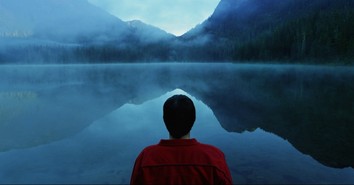The Good Lie Makes for a Good Reminder

DVD Release Date: December 23, 2014
Theatrical Release Date: October 3, 2014
Rating: Rated PG-13 for thematic elements, some violence, brief strong language and drug use
Genre: Drama
Run Time: 110 minutes
Director: Philippe Falardeau
Cast: Reese Witherspoon, Corey Stoll, Sarah Baker, Arnold Oceng, Ger Duany, Emmanuel Jal
"They call us the Lost Boys of Sudan but I don't think we are lost. I think we are found."
Based on the true stories of thousands of children orphaned by the brutal civil war in Sudan that began in 1983, The Good Lie is a powerful, uplifting movie about family, love, faith, survival.... and yes, about being found.
This is more than the typical "person from backward country encounters modern conveniences" story. There is some of that, of course, and it's both amusing and poignant. But these Lost Boys are not stereotypes; they're individual, ambitious, conflicted people trying to adjust to their new surroundings without losing themselves.
A Special Message for Crosswalk Readers from Ron Howard about from crosswalkmovies on GodTube.
The trailer suggests The Good Lie is focused on Carrie (Reese Witherspoon, Mud), an employment agency counselor tasked with finding the boys jobs on their arrival in the U.S. Since The Good Lie is from the executive producer of The Blind Side, it's a reasonable assumption that this is a similar 'rescue' story. It's really not. Carrie is a bit of a lost soul herself: a trash-talking, morally shaky young woman who is important to the story but hardly the heart of it. That belongs to the boys themselves. Their physical and emotional journey is much more captivating than Carrie's "self-centered woman gets a clue" subplot, though she does make a good foil for the real heroes.
Mamere (Arnold Oceng), his brother Theo (Femi Oguns), and their sister Abital (Kuoth Wiel) are just children when their South Sudan village—and all the adults in it—are destroyed. The youngsters set off on foot with only what they can carry, which includes their family Bible. Hunted by soldiers, ravaged by illness, the children are forced to—among other things—drink their own urine to stay alive. Along the way they meet Jeremiah (Ger Duany) and Paul (Emmanuel Jal) and form a new family. After facing unimaginable hardship they reach a refugee camp and—more than a decade later—are brought to the U.S. Their new home may be more comfortable, but in many ways it's just as dangerous as the world they left behind. At least in Sudan it's easy to recognize a lion; in the U.S. lions come disguised as people.
When your life changes so drastically, it can be hard to remember who you are. Mamere, the erstwhile "chief" of this little tribe, dreams of becoming a doctor but like the others has to take menial jobs to pay back the cost of his trip to America. Jeremiah, the preacher of the group, has to decide if his beliefs outweigh his need for a job. They, and the others, do their best to cope with this strange new world while still dealing with the emotional fallout of their battle-scarred childhood.
As these determined young people suffer and survive, the emotion in their eyes is authentic. There's a reason for that: in many ways this is the actors' real-life stories. Duany, Wiel, and Jal are all Sudanese refugees—Duany and Jal are both former child soldiers—and Oceng is the son of a Sudanese refugee father. The younger versions of the lost boys (and girl) are beautifully portrayed by children of real-life Sudanese refugees: Peterdeng Mongok, Okwar Jale, Thon Kueth, Beng Ajuet and Kejo Jale.
Speaking of emotion and eyeballs, if you can watch this movie without tearing up at least once there is something wrong with you. Yes, it pretty much follows a formula but the reason formulas exist is because they tend to work. Director Philippe Falardeau (writer and director of the Oscar-nominated foreign language film Monsieur Lazhar) brings this story of survival to life with grace, humor, and dignity.
John 15:13 says, "Greater love has no one than this: to lay down one's life for one's friends." Sometimes we need to be reminded what that looks like. The Good Lie does that, and more.
CAUTIONS (may contain spoilers):
- Drugs/Alcohol: Drinking, smoking (pot), spiked punch at a party.
- Language/Profanity: God’s name taken in vain; b-s; holy cr**; he**; a**hole. Carrie has a potty mouth, once shouting, "Who do I have to screw around here to see a g-d supervisor?" (Given her history, she'd probably follow up on the offer if need be.)
- Sex/Nudity: Carrie is shown in a hotel bed after an afternoon 'encounter'; she is clothed but he is not. Some kissing and caressing. Some talk/sight gags with her bra, which she neglects to put on and is found by one of the boys (who may or may not know what it is).
- Violent/Frightening/Intense: The early scenes are especially intense: village is attacked, children are gunned down, children have to swim through a river of dead bodies, children and adults die. Later scenes are more emotional violence although there are a few fights.
- Spiritual Themes: Among other things, it's a beautiful example of John 15:13, "Greater love has no one than this: to lay down one’s life for one’s friends."
Publication date: September 29, 2014
Originally published September 29, 2014.







